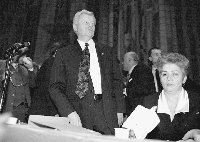SPU Congress - Retreat or Time-Out?

One the other, declarations by Speaker Tkachenko in Moscow favoring integration, clearly marked not only the launch of his presidential campaign but also scorned his potential supporters' opinion. This is apparently why the SPU congress looked like a purely organizational event, the purpose of which, according to one of the party's leaders, Stanislav Mykolayenko, was "to reelect the party leadership in accordance with the statute and enter 1999 as legitimate party."
The SPU's increase by 5,500 new members and establishment of 67 new party branches in the regions dominated Oleksandr Moroz' report. The Communists, who expected the congress to pass epoch-making decisions, as well as Socialists, who predicted a more radical turn of events on its eve, were somewhat perplexed. Of course, questions of "the people's opposition Left bloc" and presidential elections were raised at the congress, but they did not dominate it, as some members of the party's political executive expected, and they surfaced but rarely.
Oleksandr Moroz made several declarations, which should be considered not only sensational but help us understand "with whom and how will the Socialists Party be" as Mykolayenko put it. Moroz twice attracted attention to the fact that "referendum may become the only way to oust the bandit regime from power." According to him, "if the politicians on Bankova Street (the Presidential Administration - Ed.) continue to violate the Constitution and laws, then it is possible that the Parliament will initiate a referendum to stop such outrages."
Moroz' intention to "insure himself with the help of a referendum" was seen by his potential allies, in particular by the Peasant Party, as uncertainty on the eve of the 1999 presidential elections. The SPU leader's declaration that "he is ready to meet (other leftists) halfway, down to supporting not a Socialist, but a candidate capable of changing the present course against the people" support this to some extent.
According to the Peasants, Moroz's declaration about a broad political bloc (instead of a purely leftist bloc as announced earlier) without entering limitations for various political forces, and his proposal not to divide politicians into leftists and rightists, also point to this.
The Communists, who are considered the SPU's main potential allies, were represented at the congress by inexpressive third rate figures. This shows that for the time being that the CPU continues to follow its "policy of negotiations and consultations," based upon mutual agreement. Despite their expectations, in his report Moroz said nothing about the leftist bloc of the "people's opposition." Confused, they rushed to announce this a "serious error." We can understand them. According to delegation members, after the Speaker's statements in Moscow, Communist leader Petro Symonenko was apparently shocked more than anyone: against the background of the Speaker's integrationist rhetoric. Symonenko, who had struggled desperately to the unify decisions in Parliament, looked simply redundant. The banner of integration was snatched from his hands, and Tkachenko reaped the fruit of agreements with the Russian Duma without leaving anything to Symonenko. Here one might recall the leftist bloc, where the CPU leader was at least offered the role of the full partner. In alliance with Tkachenko they would not think twice of the CPU head and his largest party - the visit to Moscow showed this in the best way possible. We can suppose that the Communists will prefer to unite with the Socialists, which is simply necessary for SPU at this stage. On the other hand, the idea of durable agreements between the CPU and SPU still seems a flight of fancy. This connection can only be reinforced by a preliminary division of the President's and Prime Minister's roles. But the moment Moroz publicly speaks about "specific candidates who might chair the Cabinet of Ministers after winning the elections," he will lose many of his supporters. Obviously, understanding the duality of the situation, the SPU leader decided to take some time out now.
Incidentally, there might be other reasons for such a time-out. For
instance, the SPU leader's declaration of his possible declining to run
himself for the sake of achieving "the great goal" of removing President
Kuchma from office, basically means that participants of the bloc, in which
the Peasant Party longs to play first violin, should make declarations
in response. Otherwise, it will become clear that they want not the removal
of the "anti-people regime," but to come to power themselves. Intentionally
resigning the leadership in the process of unification, speaking about
possibilities of their own compromise and hinting that a Peasant Party
representative might become the sole candidate, Moroz seems to deliberately
be giving the Peasant Party of Ukraine the chance to snatch the initiative
and let Tkachenko show what he is up to, so that both Kuchma and the leftist
bloc can see how far and how resolutely the Speaker is prepared go.
Newspaper output №:
№47, (1998)Section
Day After Day





